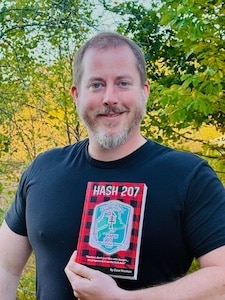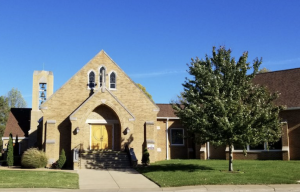Anthem of hope

A writer currently residing in Portland, Maine, recently published his first novel, a book about fighting for one’s home inspired by his travels around the world, the story’s titular Hash House Harriers and the sort of change he’s witnessed in community’s like his hometown of Columbia.
Dave Norman is the author of “Hash 207,” his first novel and his latest work in a lengthy writing career.
Norman grew up with strong local roots. He graduated from Columbia High School in 2000 – he noted that his class just recently celebrated their 25th reunion.
His education continued at Westminster College where he received a Bachelor’s in English and Psychology in 2004. In 2007, he earned his Master of Arts in Liberal Studies (Creative Writing) from Dartmouth College.
More recently, he acquired a Master of Social Work from the University of New England in 2023.
Along with writing, Norman currently works as a mental health therapist, focusing in particular on men, veterans and people from groups for whom mental healthcare is often stigmatized.
His writing career stretches back to his time in Monroe County, where he did some work for the Monroe County Clarion and the Republic-Times, though much of his early writing was done as a sports reporter, covering the game of paintball for various publications including Action Pursuit Games Magazine.
This and other work has had him traveling around the country and beyond.
“My freelance writing career has taken me around the world several times, from Kuala Lumpur, Malaysia, to Havana, Cuba, to Moscow, Russia,” Norman said.
Norman has written a number of books in the past, including the 2011 book “Following Josh,” a nonfiction story about his trip with fellow local author Josh Vise on the Trans Siberian and Trans Mongolian Railroads from Beijing, China, to Warsaw, Poland.
Another of his books written especially for a Monroe County audience was “A Small-Town Celebration,” a photojournalistic piece intended to celebrate Columbia’s sesquicentennial.
While he didn’t offer a deep dive into the plot of “Hash 207” for the sake of spoilers, Norman did offer his thoughts on the themes and personal experiences that went into it.
“It’s a socially conscious novel about a band of artists joining together with the Hash House Harriers, an international drinking club with a running problem – joke fully intended – to push back against the affordable housing crisis and defend their homes from conflicted local politicians and a scheming developer,” Norman said.
Taking place in a fictionalized version of his real home of Portland, the book draws greatly from Norman’s love of his community as well as the gentrification and change he’s seen in many other places.
The conflict in the novel centering around a community impacted by incoming development, he said he drew in large part from what he’d seen growing up.
“I kind of got my roots of noticing development interacting with nature, development moving people around growing up in Columbia watching the bottom lands and the edges of town be developed, watching forests and fields being turned into neighborhoods and then watching as some of the urban renewal in St. Louis, and a little bit of the urban renewal in Columbia, started moving people around,” Norman said. “As property values went up and rents went up, it was good for some folks, kinda rough for others.”
He further described how the issue is experienced by people everywhere but is particularly notable in major cities.
“I saw the central irony of people who made the places so fun and funky and artsy to live in were some of the first people getting priced out from being able to live in the places they made,” Norman said. “Painful irony in there that rings true in St. Louis, New York City, Los Angeles, Chicago, fill-in-your-name of big cities.”
Deciding how to combat this sort of drastic change to one’s home, Norman said, is the largest dilemma the novel’s characters encounter as they weigh the costs and benefits of protest, diplomacy, violence and any other means of protecting their community and beliefs.
The story also closely involves the Hash Hound Harriers, a real club with “kennels” based around the country and internationally that Norman has been involved with for years.
He recalled his first interaction with the Harriers during an overseas writing excursion in Penang, Malaysia, around 17 years ago.
Living out of his luggage at the time, he recalled a friendly interaction with a New Zealand Air Force Officer who invited him to come running and drinking with friends, likewise offering him a place to stay for a bit.
“I showed up at the appointed intersection. He was there,” Norman said. “Grabbed my backpack, my camera bag, all my worldly possessions I had on that side of the globe, hucked them in the trunk of somebody else’s car, car drove off, and there I was with 30 expats and locals and all kinds of people I’d never met before that moment… They said, ‘Here you go. We’re gonna head off into the jungle now. Try not to get lost, and watch out for leeches.’”
He described that experience, running with the group as they told dirty jokes and ribbed one another, coming across booze during their late evening run and continuing to enjoy a night of hashing.
Looking for a group to call his own, he came across another kennel when he moved to Portland, instantly charmed by them when he was fooled into participating in a run in a “pirate” outfit only to find everyone else dressed as rats wielding pies.
Norman said that, while the book features no shortage of such fond and humorous musings courtesy of the Harriers, it also comes from a deeply personal place.
He noted his desire to tell a story about change – again pointing to his experience with gentrification – as well as his passion for mental health and community.
He spoke about a friend of his who took his own life years ago, recalling how heavily that loss affected him.
“It began as a little bit of a nostalgia project inspired by seeing some of the challenges replicated in St. Louis,” Norman said. “And then from there, one of my friends passed away on Sept. 10, 14-15 years ago, and that really just shook me. I spent a lot of time thinking about men’s mental health concerns… mental health in general, the stresses that people are under in modern society, how we lean on our communities for support, what kind of support matters individually. I see these echoes of larger social challenges echoing in individual people’s lives and thought, ‘Man, there is just so much to unpack here.’”
Community was the core of what Norman had to say about “Hash 207.” While the book has gone through a great deal of work to reach a large market – being fully written only to be scrapped and rewritten through plenty of honing and refocusing – he said the audience he’d especially like to read the novel are those in need of that sense of community.
“I would love for this book to reach people who feel alone, like no one understands their struggles, to reach them with a message of hope,” Norman said. “There are others who are paying attention, others who care, and there is a place for you. As our characters in this novel have made a place together, there is a place for you.”
Norman voiced his appreciation for his early readers who offered their thoughts of the book, including some authors for whom he feels great respect – one of whom described it as “an anthem of hope” – and a number of his fellow Harriers.
He spoke with particular passion and thanks for his experience working with editor Alan Rinzler, who is known for his work with authors Hunter S. Thompson, Toni Morrison, Tom Robbins and others.
“Hash 207” is currently available as a paperback or eBook. Norman encouraged readers to support their local bookstore, though copies are available through Amazon and Barnes and Noble with author signed copies available through the book’s website hash207.com.
Additionally, readers can check out the first chapter for free at hash207.com/chapter-one.






